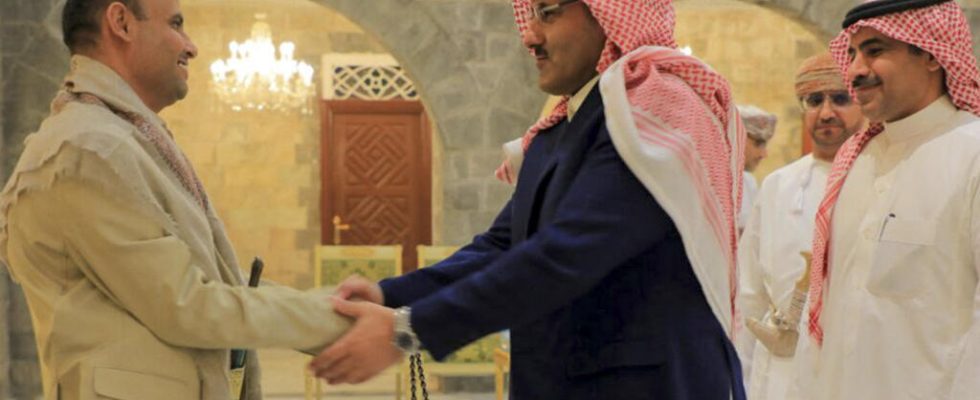A rare Saudi delegation visited Sanaa, Yemen, on Sunday April 9 to negotiate a lasting truce and discuss the peace process with the Houthi rebels.
At Yementhe prospects for peace are multiplying eight years after the start of the war, reports our correspondent in the region, Nicolas Keraudren. Even if this information has not been officially confirmed by Riyadh, a Saudi delegation was this weekend in Sanaa, an area controlled by the Houthis.
Saudi Arabia’s ambassador to Yemen, Mohammed al-Jaber, was received by the rebels’ political leader, Mehdi Machat, according to Houthi media, Saba news agency and Al-Massira TV channel. The latter broadcast images showing the two men shaking hands.
The Saudi negotiators came discuss ways to move forward towards the establishment of peace “, according to two Yemeni diplomats working in the Gulf and who requested anonymity. Contacted by AFP, the Saudi authorities declined to comment on this information.
Negotiations
The rebels also welcomed the release of 13 prisoners in exchange for a Saudi detainee. Going forward, the two sides could agree a new truce which has yet to be renewed since last year. But for this, demands have long been imposed by the rebels, Yemeni government sources told AFP. They ask the lifting of the air and maritime blockade, preventing airports and ports under rebel control from operating without the approval of Riyadh or thee payment by the government of the salaries of all civil servants.
For more than eight years, Sanaa, like much of the territory, has been under the control of the Houthis. The military coalition led by neighboring Saudi Arabia since 2015 in support of pro-government forces has failed to dislodge the insurgents.
Iranian influence
These discussions are part of the normalization of diplomatic relations between Riyadh and Tehran recorded nearly a month ago in China. Iran could indeed use its influence on the Houthis to put an end to this war from which Saudi Arabia is trying to extricate itself.
At the same time, a Saudi technical team was, in any case, in Tehran. The reopening of a diplomatic representation of the kingdom in Iranclosed since 2016, was on the agenda.
(With AFP)
► To listen also: Yemen: the forgotten war
Like whole swaths of Yemeni territory, Sanaa has been under the control of the Houthis, a movement close to Iran, for more than eight years. The military coalition led by neighboring Saudi Arabia since 2015 in support of pro-government forces has failed to dislodge the insurgents.
Saudi officials have visited Sanaa in the past, but visits are rare and often limited. But while Sunni Saudi Arabia has been trying for several months to extricate itself from this quagmire, the recent rapprochement with its great regional rival, Shia Iran, has fueled hopes for an appeasement in the Middle East, in particular in the Yemen.
The poorest country on the Arabian Peninsula is suffering one of the worst humanitarian crises in the world. The eight-year war has left hundreds of thousands dead and millions displaced, with colossal challenges like epidemics, acute hunger and economic collapse, amid declining international aid.
– “Priority” –
“Making progress in Yemen has always been a priority for the Saudis but, without the Iranians, things would not go as fast as what we see today,” Saudi analyst Hesham Alghannam told AFP. .
“In the past, discussions with (the Houthis) have not been very fruitful, to say the least,” noted the Riyadh-based academic.
Arrived on Saturday, Omani mediators are also in Sanaa to allow the signing of an agreement on a lasting truce.
A truce was agreed a year ago in Yemen and has since been largely held, but was not formally renewed when it expired last October.
A new truce under discussion includes demands long imposed by the rebels, Yemeni government sources told AFP.
The first is the lifting of the air and sea blockade maintained by the Saudi army on the country, preventing airports and ports under rebel control from operating without Riyadh’s approval.
Another demand: payment by the government, which holds most of the energy wealth, for the salaries of all civil servants, including those working in Houthi-held areas.
– “Tired” –
Despite fears that an agreement between Saudis and rebels will not necessarily mean the end of the civil war in Yemen, many on the streets of Sanaa want to keep hope for a soon peace.
“We want the war to end. We are tired,” Ali Hussein, a 23-year-old resident of the capital, told AFP.
Mahammed Dahmash, another 35-year-old resident, also expressed hope “for an agreement more than a truce that would completely end the war”.
The same glimmer of hope in Hodeida, a large western port region. Like many civil servants in Houthi-controlled areas, Mansour has not received a salary for seven years.
“War is not only rockets and missiles, but also our economic situation which has deteriorated,” the 46-year-old teacher told AFP, refusing to divulge his surname.
Imane Mohammed, another resident of Hodeida interviewed by AFP, hopes that by the Eid holiday, which punctuates the current month of Muslim fasting, “the situation will calm down and return to normal”.
